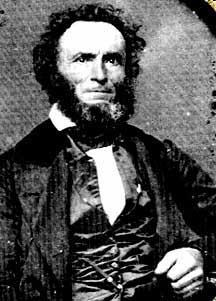Friedrich Münch (politician)
Friedrich Münch (born June 25, 1799 in Nieder-Gemünden ad Ohm , † December 14, 1881 in Augusta , Missouri ) was a German-American pastor, winemaker, politician and writer.
Life
Münch grew up in his home village, where he was initially only taught by his father. In 1814 he went to high school in Darmstadt. From 1816 to 1819 he studied theology at the University of Giessen . In Gießen he became a member of the Germanic League Gießen and the Christian-German fraternity / honor mirror fraternity in 1816 . Here he got to know the Follen brothers ( Adolf Ludwig Follen , Karl Follen and Paul Follen ), the founders of the Giessen blacks . He had a lifelong friendship with Paul Follen, who then married his sister Maria in 1825.
In 1833 he and his brother-in-law Paul Follen founded the Giessener Emigration Company in order to establish a German-populated federal state in the United States as a model for a future German republic. They managed to bring 500 people who wanted to leave the country to America in 1834. Münch with 250 emigrants (including some families from Niedergemünden, including many of his relatives) first stranded on the Weser island Harriersand . They then landed with the Medora on July 24, 1834 in Baltimore .
The utopia of one's own state soon had to be given up. Münch, Follen and related families settled near the confluence of the Missouri and Mississippi rivers in the German settlement of Dutzow in Warren County founded by Baron von Bock in 1832 . Friedrich's brother Georg soon joined them and he set up his farm in the immediate vicinity. Münch moved to Augusta in 1859, where he and his brother Georg Münch (July 5, 1801 - April 26, 1879) founded the Mount Pleasant Winery ( 38 ° 34 ′ 15.2 ″ N , 90 ° 53 ′ 9, 3 ″ W ) built.
Münch took part in political life. He was a co-founder of the Republican Party and was a member of the Missouri Senate . Together with Friedrich Hecker , the Baden revolutionary from 1848/9, who had also emigrated to the USA, he resolutely opposed slavery and it is thanks to his influence that Missouri did not join the southern states. One of his sons was one of the first volunteers of German descent to answer Lincoln's call to arms. He fell on August 10, 1861 in the Battle of Wilson's Creek under the command of Franz Sigel , who had been Minister of War of the Baden Revolutionaries in 1848/9.
He worked as a writer for German and American newspapers. He published his works under the pseudonym Far West . His biography was first published in 1875 in the German-language monthly " Der Deutsche Pionier ".
As a result, Münch's descendants achieved prosperity and great prestige in St. Louis. One of his daughters, Emilie, married a son of Paul Follen, Dr. William Follenius (1829-1902).
Works
- A Treatise on Religion and Christianity, Orthodoxy and Rationalism.
- American Grape Culture , 1859
- Missouri State, portrayed with special consideration for German immigration , 1859
- School for American grape culture: brief but thorough and practical guide to the laying out of vineyards, the treatment of vines, and the production of wine and North America. , St. Louis 1865
- American School of Viticulture , St. Louis 1877
- Spiritual Teaching for the Emerging Youth for Use by Higher Education Teachers: A Book for Teachers and Students and All Friends of Free Thought , St. Louis, 1872
- Friedrich Münch (Ed.): Memories from Germany's most gloomy times, depicted in the life pictures of Karl Follen, Paul Follen and Friedrich Münch , St. Louis (Missouri) and Neustadt ad Haardt 1873.
- Friedrich Münch: Collected Writings, 1902, St. Louis
literature
- Jörg Nagler : Münch, Friedrich. In: New German Biography (NDB). Volume 18, Duncker & Humblot, Berlin 1997, ISBN 3-428-00199-0 , p. 518 f. ( Digitized version ).
- Helge Dvorak: Biographical Lexicon of the German Burschenschaft. Volume I: Politicians. Sub-Volume 4: M-Q. Winter, Heidelberg 2000, ISBN 3-8253-1118-X , p. 163.
Web links
- Medora passenger list (PDF file; 21 kB)
- Mount Pleasant Winery
- Missouri Wine Route
- Short biography
- Biography
See also
| personal data | |
|---|---|
| SURNAME | Münch, Friedrich |
| BRIEF DESCRIPTION | German-American pastor, winemaker, politician and writer |
| DATE OF BIRTH | June 25, 1799 |
| PLACE OF BIRTH | Niedergemünden ad Ohm |
| DATE OF DEATH | December 14, 1881 |
| Place of death | Augusta , Missouri, USA |

